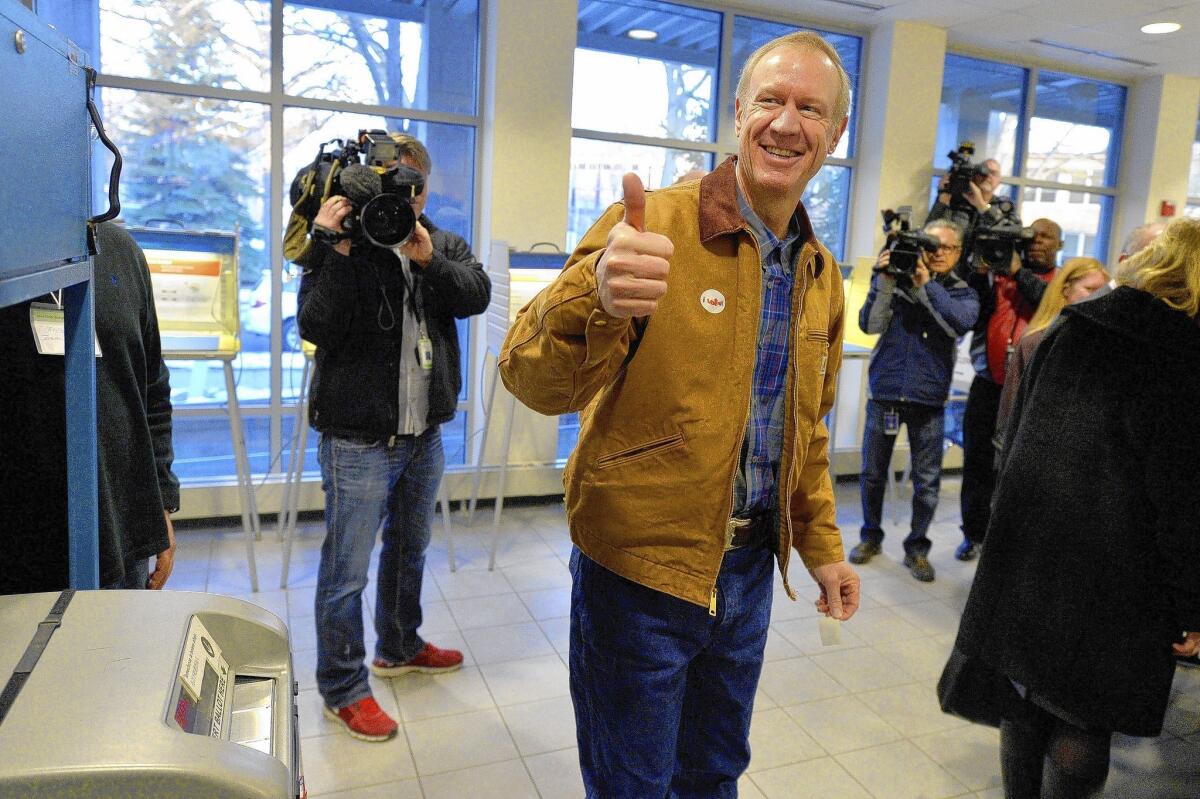Primary over, Illinois GOP is in strong position in governor race

- Share via
CHICAGO — President Obama’s Illinois has been one of the most reliably blue on the political color scale, but Tuesday’s primary positioned Republicans for a strong shot at retaking the governor’s mansion in a state mired in chronic fiscal disarray.
Venture capital tycoon Bruce Rauner, a politically influential player among this city’s corporate elite but a first-time candidate, narrowly captured the Republican nod for governor over three party veterans in a race fueled by the new nominee’s vast personal wealth and biting disdain for public employee unions.
“Let’s go get ‘em,” Rauner declared as he claimed an unexpectedly slim victory over state Sen. Kirk Dillard, who had courted union support and attacked Rauner for trying to demonize hardworking civil servants.
“This is about shaking up Springfield, shaking out the corruption by its roots,” Rauner said.
Rauner, 58, in November will face incumbent Democrat Pat Quinn, who has low voter approval ratings but catlike political survival skills that for decades have kept him in the public eye as a populist outsider in his own party.
The general election battle, possibly the GOP’s best hope of picking up a governorship from Democrats, promises to be expensive and bruising. Special interests on the right and left are pouring in resources to help two shoot-from-the-hip rivals paint each other in broad, unflattering stereotypes. Think Inspector Clouseau versus Inspector Javert.
To Rauner, Quinn is “the worst governor in America” whose bumbling management of state finances has driven away business and jobs with a big tax increase. To Quinn, Rauner is an exemplar of the so-called 1%, a rich, out-of-touch executive who is forcing the working class to bear the brunt of economic troubles.
There is little doubt that Quinn, 65, is vulnerable.
Governors always love to brag about how their states lead the nation in this or that, but the list of Illinois chart-toppers these days has become a major Rauner talking point. Among the states, Illinois has by far the worst pension debt and the worst credit rating, a fiscal drag that Rauner likens to “a death spiral.”
Yet Quinn, who replaced the impeached and now imprisoned Rod R. Blagojevich as governor in 2009, narrowly won election in his own right the next year in a contest where Republicans highlighted many of the same complaints.
Rauner’s bet is that voter fatigue with Quinn, coupled with a relentless ad campaign financed from his deep pockets and those of well-heeled peers in the business world, will be a difference maker this time around.
Underlying Rauner’s campaign from the first has been a war on unions that represent government workers, which he contends are all-powerful in Springfield, the capital, and responsible for laws and policy decisions that hurt taxpayers.
Any resemblance to Wisconsin Gov. Scott Walker is completely intentional, Rauner acknowledges, though his plans to strip away union clout go well beyond anything attempted by the controversial Walker.
Rauner has told Republican audiences that many public workers make too much and he wants to cut their pay. He wants to end teacher tenure as well as traditional government pensions, shifting tens of thousands of public employees into 401(k)-style retirement plans without the additional safety net of Social Security enjoyed by those in the private sector.
Democrats typically count on strong organized labor support in elections, but government unions have been furious with Quinn for his support of recently enacted pension curbs nowhere near as radical as those advocated by Rauner.
That makes the state’s largest public unions a wild card for the fall. Opposed to Rauner and unhappy with Quinn, it is unclear whether they will sit out the campaign or find some way to make peace with the Democratic chief executive.
Both candidates have obvious vulnerabilities. Quinn must answer for the state’s dire financial shape despite a major tax increase he signed into law in 2011. Rauner has been forced to defend his business record, including his role as a director of a document imaging firm caught in a major accounting scandal that sent three top executives to prison.
As contenders, the two are a study in not just political contrasts but personal as well. Quinn, who lives modestly on his governor’s pay, has spent most of his adult life in or around public office.
Rauner for a quarter-century helmed $10-billion corporate takeover specialist GTCR Golder Rauner, along the way pocketing a personal fortune he has tapped to buy seven luxury homes from the Chicago area to the Florida Keys, New York and Montana.
On the primary campaign trail, that opulence invited ridicule from rivals and comparisons to Mitt Romney, a fellow venture capitalist-turned-politician with his own extensive portfolio of homes.
Rauner rejects any comparison to the 2012 Republican presidential nominee. “He came across as a blue blood,” said Rauner, who insists he is anything but. “I’m a regular guy.... I drink beer and I smoke a cigar and I ride a Harley and I love to fish.”
During the primary, Rauner pumped more than $6 million of his money into the campaign, a self-funding record for an Illinois governor’s primary and nearly three times what his rivals combined could muster from any source. And he’s made it clear there’s more where that came from for the general election fight.
More to Read
Sign up for Essential California
The most important California stories and recommendations in your inbox every morning.
You may occasionally receive promotional content from the Los Angeles Times.










